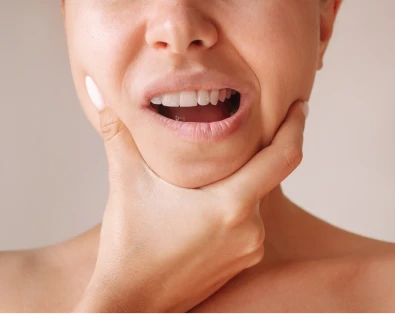
The temporomandibular joint (TMJ) is the hinge joint that connects the lower jaw to the skull, allowing for essential movements such as chewing, speaking and yawning. When this joint becomes inflamed, misaligned or overworked, it can lead to temporomandibular joint disorder (TMD). TMD can cause persistent discomfort and significantly impact daily life. Dr. Chen provides TMJ treatments in Glen Allen and Louisa, Virginia, to alleviate this discomfort and help you regain healthy oral function and quality of life. Call John J. Andre, DDS & Associates at (540) 967-0777 today to schedule your consultation with our dental professionals and learn more.
Recognizing TMJ Disorder Symptoms
If you suffer from frequent jaw pain or facial discomfort, you may have TMJ disorder. Common symptoms include:
- Clicking, popping or grinding sounds when opening or closing the mouth
- Difficulty or pain when chewing
- A locked or stiff jaw
- Frequent headaches or migraines
- Pain in the jaw, neck, shoulders or ears
Symptoms can range from mild to severe, with some cases resolving on their own while others require professional treatment. Identifying the underlying cause is key to determining the best approach to relief.
Causes of TMJ Disorder
TMD can develop for various reasons, including:
- Bruxism (teeth grinding or clenching): Excessive pressure on the jaw joint can lead to strain and inflammation.
- Misaligned bite: An imbalanced bite can place uneven stress on the jaw, leading to discomfort.
- Arthritis: Osteoarthritis or rheumatoid arthritis can cause degeneration of the TMJ.
- Trauma or injury: A blow to the face, whiplash or other trauma can contribute to TMJ dysfunction.
- Chronic stress: Tension in the facial muscles due to stress can exacerbate jaw pain and dysfunction.
TMJ Treatment Options
Our dentists will perform a thorough evaluation to determine the cause of your TMJ disorder and develop a customized treatment plan. Treatment options may include:
- Lifestyle adjustments: Avoiding hard foods, practicing stress management techniques, and using warm or cold compresses can help alleviate symptoms.
- Oral appliances: Custom night guards or splints can reduce pressure on the jaw joint and prevent grinding or clenching.
- Physical therapy and exercises: Gentle stretching and strengthening exercises can improve jaw mobility and reduce tension.
- Dental treatments: Orthodontic adjustments, restorative treatments or occlusal adjustments may be recommended to correct bite alignment.
- Medications: Anti-inflammatory drugs, muscle relaxants or other medications may provide temporary relief from pain and inflammation.
- Advanced interventions: In severe cases, BOTOX® therapy or surgical procedures may be necessary to address structural issues within the joint.
If you are experiencing TMJ pain, seeking treatment can help restore comfort and function to your jaw. Contact our office today to schedule a consultation and take the first step toward lasting relief.




















